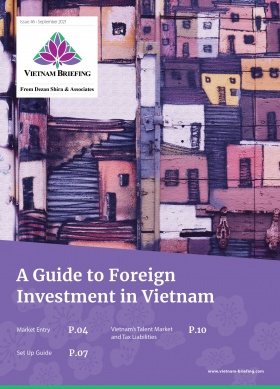Vietnam’s New Normal: The Hybrid Work Strategy
- The hybrid work strategy will likely be a key feature in Vietnam’s new normal as it reopens its economy.
- Businesses that embrace this model are likely to find long terms gains including finding and retention of talent.
- While there will be challenges, businesses that adapt will have a competitive advantage in the long term
Since the pandemic, a new work model has been permeating offices worldwide. The hybrid workplace is a relatively new model that has allowed employees to work from home while allowing them to come to the office depending on the pandemic situation and movement restrictions. As measures related to the pandemic are lifted, Vietnam’s employers are coming to acceptance of what a modern workspace should look like while implementing policies that benefit themselves as well as employees.
Around the world even last year, companies such as Goldman Sachs in the US pushed for employees to be back in offices but had to delay due to the spread of the virus and new variants. They’ve now taken a more nuanced approach and adopted a flexible policy for employees. Even with high vaccination rates in western countries, infections rates have kept up forcing employees to put health first, allowing employees to work remotely.
In Vietnam’s context, while this trend is not new, the pandemic and associated lockdowns have accelerated the hybrid model, particularly in the larger cities. Businesses in Vietnam had to urgently rethink how they work and try to adapt as new regulations sometimes changed on a daily basis, particularly during the lockdown.
The traditional work model is changing
The traditional work model has changed forever. Even since 2020, businesses in Vietnam had to allow their staff to work from home to prevent the spread of COVID-19. Hybrid models offer an ideal mix of office and remote working and this has been especially welcomed by employees. As per a survey by Manpower Group – 42 percent of Vietnamese employees liked the idea of working three to four days per week from home. In contrast, 41 percent of employers would allow hybrid work. Employers in Vietnam still prefer employees coming to the office.
Many employees, however, want to return to the office because they do not want to stay at home the whole time. Some do not have an appropriate workspace at home and miss their colleagues.
Thus, businesses will need to adapt and cater to varied preferences while supporting employees. The pandemic has forced businesses to rethink efficient strategies for hybrid work for the foreseeable future. This has meant the establishment of new workflows that mitigate staff travel while also ensuring that work timelines are met. Businesses will have to come up with an efficient workplace strategy regardless of where their employees are.
Here, we outline some strategies that businesses can employ for a hybrid work strategy.
Redefining the workspace
The traditional workspace of cubicles may be outdated depending on the instance. Companies must understand business needs as well as employee requests. This doesn’t necessarily mean a redesigning of the office, but it should be a thoughtful redesign facilitating collaboration for ideas, meetings, and teams. This can continually evolve as businesses try and test various strategies.
For example, after lockdowns were lifted, our offices implemented a hybrid work model where some teams could come in based on their work needs and work other days remotely. In addition, some desks are permanent for employees that come every day. Other desks are shared, where employees that are not required to come daily, can share the workspace with other colleagues. This strategy also helps reduce costs, as a smaller office area, less desk space, and furniture are required.
Future pandemics likely
While COVID-19 is a wake-up call, there are likely to be future pandemics that may be even more deadly. Organizations need to ensure full-proof business continuity plans (BCP) to ensure their business can continue to operate at short notice. These include social distancing, disinfecting, contactless technologies, and airflow infrastructure. Businesses can now itself implement permanent solutions so that they can prepare for any future disruptions.
Flexible leasing
Businesses can enter into flexible leasing arrangements which will allow for fast decision-making in case of changing market conditions and restrictions. Employers should try and negotiate a flexible contract with landlords to cater to this new normal. Due to the pandemic, several businesses have been unable to pay rental fees which leads to them losing the property or be dragged into lengthy court cases. Having a good relationship with the landlord helps, but re-negotiation will also ensure that the business can meet rental costs should the situation arise. This will also help as businesses can react to different market needs based on demand.
Mental wellbeing is important
While hybrid work is largely seen as a positive, there are challenges. Employees have complained of increasing workloads as more meetings are planned, and as lines between work and home get blurred. Apart from stress, employees have also complained about feeling isolated, experiencing mental health issues. In the survey by Manpower Group, around 78 percent of Vietnamese employees ranked mental wellbeing as the most desirable aspect of their job.
Businesses must ensure that they design a workspace that promotes connectivity as well as supports wellbeing and mental health in the workplace. Managers may also need to be trained to better respond to employees that might be facing such issues.
Traditional mentality, behaviors becoming outdated
Business management should focus on employee emotional needs. The hybrid work model demands a much-needed shift in leadership styles. Traditional methods have become obsolete as workers want more time and flexibility. In Vietnam, 74 percent of employees want flexible working conditions especially in regards to their commute.
The hybrid strategy will demand business leaders to move from traditional models that rely on structured places, hours, and roles to a more organic model based on flexibility and decisions that are decentralized. To do this, businesses have to use data to cater to the different segments of the workforce and allow employees in the decision-making process. Businesses also do not have to provide solutions themselves but can involve employees to be a part of the solution.
Therefore, employers should allow new ways of working by allowing management to respond with the right decision using data. Businesses will need to define how they measure results and outcomes. In Vietnam, the collective team carries value rather than an individual. Thus, businesses could reward teams rather than individuals to ensure a collaborative environment rather than employees working in silos. Feedback is important, and businesses should ensure there is a mechanism in place that is quick and open.
Businesses also need to align senior leadership with the new strategies. This will involve buy-in from management so that employees get a clear message. While businesses may not be able to implement all decisions that are made, they can prioritize actions that have the most value and impact.
Employee handbook updating
The hybrid work strategy will add another section in the employee handbook. This will likely involve work health and safety protocols. It’s also a good wake-up call for businesses to update their policies and responses to address worker safety and health concerns. In Vietnam vaccine hesitancy has remained low, therefore vaccine mandates and face mask-wearing are likely easier to implement across physical offices.
Introducing such policies for those that want to return to the office will ensure workers are protected. Businesses should work closely with HR and their legal teams to update policies as per the ‘new normal’.
Businesses will also have to factor salary packages, performance measurement, workers outside of the country, tax, and immigration issues.
Opportunities
The hybrid work model is also an opportunity for businesses. Employers that are flexible can use this model as a retention tool and attract talent. As Vietnam reopens, there has been an increasing demand for talent and high skilled workers. With borders still closed and increased costs to hire foreign employees, businesses have started to look at local staff to fill positions. Those that have the right skills are likely to choose employers that have flexible work arrangements.
Therefore, there is likely to be increasing competition for talented workers; employers that are flexible are likely to attract the right talent. Adopting this model shows that employers are willing to listen while improving the work culture as per the new normal. Employers should therefore seize rather than resist the hybrid model moving with current trends and also showing that the business is sympathetic and responsive.
Challenges
A hybrid work model may require a company to significantly invest in technological infrastructure. However, these short-term pains may prove invaluable in the long term. While several businesses have already invested in technology, many have fallen short. Businesses that haven’t will need to invest and prepare for the long term.
One of the other significant challenges is to adapt and come up with policies related to the hybrid model. Most employees do not want to work from home completely due to limited interaction with colleagues and managers. Businesses both big and small will have to manage this and will have to come up with the right mix of policies and flexibility to ensure they are getting the most from their employees while managing expectations.
In addition, the hybrid work model is not suitable for some job profiles such as factory workers who work in shifts, workers in food and beverage establishments, and some critical departments such as accounting or legal in a company.
Nevertheless, businesses that are able to adapt and move towards this trend are likely to find success and full-proof their operations in the context of future pandemics. The trick is to find the right balance and be flexible. It may take a few tries and experimentation to get to where the business wants, but this is how businesses evolve when faced with a new challenge.
About Us
Vietnam Briefing is produced by Dezan Shira & Associates. The firm assists foreign investors throughout Asia from offices across the world, including in Hanoi, Ho Chi Minh City, and Da Nang. Readers may write to vietnam@dezshira.com for more support on doing business in Vietnam.
We also maintain offices or have alliance partners assisting foreign investors in Indonesia, India, Singapore, The Philippines, Malaysia, Thailand, Italy, Germany, and the United States, in addition to practices in Bangladesh and Russia.
- Previous Article Vietnam to Increase Production of Russia’s COVID-19 Vaccine
- Next Article Mergers and Acquisitions in Vietnam: Domestic Players Lead Trends































